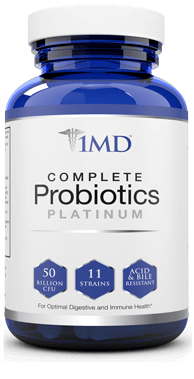- Jump to:
- Why is our microbiome important, anyway?
- What Not to do when buying a Probiotic
- The 3 Secrets of A High Quality Probiotic
- Top 5 Probiotic Supplements of 2018
- Probiotics we evaluated
Probiotics have been all over the news lately, especially now that both researchers and celebrity doctors alike are confirming the major connections our microbiome has to our overall health.
Despite its newfound popularity, many of us are still unclear about what exactly our microbiome is, why we need probiotics to help us keep it balanced, or which supplements are best to take.
With that in mind, we’ve compiled years of research about the microbiome and its effect on our health. This quick guide will help you discover everything you need to know to make the most informed decision about your probiotic supplement needs.
Why is our microbiome important, anyway?
Right now, 90% of the cells in your body are microbial. These microbes –– a general term for bacteria, archaea, protists, and other molecular organisms –– are present throughout the body.
The human microbiome is the collection of all of these microbes. This means –– you guessed it –– 90% of your body is actually your microbiome. Keeping it balanced can have huge benefits not only for your digestion, but your brain, skin, immune system, and a host of other functions.
In fact, researchers are only scratching the surface of the potential of probiotic supplements, and why they’re essential for our overall wellbeing.
Unfortunately, many of us don’t realize that, even though our digestion feels normal, we may still need a quality probiotic supplement to keep us healthy.
10 ways you're hurting your gut bacteria
Our modern Western society has adopted unhealthy activities and lifestyles that affect our microbes in a variety of ways. Most are difficult –– if not impossible–– to avoid, but it's critical to spread awareness if we want to protect our microbiome.

- Sweets. Processed sugars can feed potentially unhealthy bacteria
- Wine and beer. Alcohol consumption can alter your microbial balance.1
- Poor sleep. This can lead to subtle changes in your microbial makeup.2
- Antibiotics. These kill both good and bad bacteria.
- Not enough fiber. It serves as food for helpful microbes.
- Living in the city. Pollution can affect the number of good bacteria.3
- Water containing chlorine. Chlorine can kill both good and bad bacteria.
- Foods with artificial coloring. These are antibacterial and antifungal.
- Antibacterial soaps. Any antibacterial products can destroy healthy microbes.
- NSAID pain relievers. They disrupt digestive flora and intestinal mucus.4
If any of these apply to you, it may be time to look for a high quality probiotic. Unfortunately, sometimes it's difficult to know where to start, and many of our Smarter Shoppers reported regretting their first probiotic purchase. With this in mind, we included a section to help you skip their mistakes:
What Not to do when buying a Probiotic
Forget the Research
Many shoppers believe that it doesn't matter which probiotic they choose. This is not the case. Many supplements contain ineffective and potentially harmful additives, such as artificial fillers and colors. Binders, including magnesium stearate, chromium, gelatin, and silicon dioxide, are other infamous additives to avoid.
Rely on Amazon Reviews
Millions of Americans look to Amazon reviews before purchasing their products, but most don’t realize that up to 60% have been paid for. Some disreputable, fly-by-night companies compensate individuals for positive reviews, regardless of whether they've tried the product or not. Risking your health with reviews that are likely false is too dangerous a game to play when you’re choosing an ingestible supplement.
Prioritize Price Over Quality
We found that many lower-priced and generic probiotic supplements only contain one strain, and even worse, don't list substrains. Many of these companies also offer confusing guarantees that seem like a good deal at the time, but ultimately only hurt your wallet. Try to find a probiotic with the qualities listed below, even if that means they cost a little more than your local grocery store's generic brand.
What You Should Look for in a Good Probiotic
Based on our research and feedback from our Smarter Shoppers, these are the things to look for in an exceptional probiotic supplement:
Formulated by A doctor
It takes specific expertise to form an effective probiotic formulation. More is not necessarily better. The exact combination of strain type, quantity and prebiotics determines the product's quality. Look for real doctors specializing in gut health backing the product.
High CFU Count
Since our microbiome is composed of about 100-trillion good and bad bacteria, a high number of CFUs will have greater impact on the growth of beneficial bacteria within your gut flora. Look for a formula with a minimum of 40 billion CFUs
Multiple Strains
Taking a probiotic with a variety of good bacteria strains can help balance your microbiome. Unfortunately, most probiotic supplements only provide one type of strain. That's why it's crucial to find probiotics that use a comprehensive approach to promoting balance in your gut bacteria.
100% Vegan
Choosing an all-vegan supplement means that you avoid harmful gelatin capsules loaded with animal-based fillers like magnesium stearate fatty acids and carmine food dyes.
Try to find a supplement with at least 9 individual strains.
Focusing on the qualities above is a good start, but to find the best probiotics on the market, we suggest adding these little-known secrets to your research regimen.
The 3 Secrets of A High Quality Probiotic
it Lists Its SubStrains
The substrains listed next to each strain indicates that a specific probiotic strain has undergone clinical studies. Many probiotic formulations do not list their specific substrains. This is a huge red flag that suggests they may be using generic (and cheaper) substrains that have not been clinically studied.
It contains Prebiotics
The latest research shows using fiber-based prebiotics (such as NutraFlora Fiber) will help the probiotics populate and flourish in your gut. This will significantly increase the overall effectiveness of the probiotic.
It doesn't require Refrigeration
Refrigerated products can be damaged during shipping. Another note: you're not always going to have access to a refrigerator, so we suggest choosing a probiotic that is well-formulated to withstand room temperature and does not require being refrigerated during periods of non-use.
Our specialized ranking system
At Smarter Reviews, we employ a comprehensive evaluation system to analyze and measure the full value of products, by looking at the ingredients, clinical studies, safety, projected effectiveness, return policies, and overall customer satisfaction. This method is known as the Smarter Reviews Ranking System.
Top 5 Probiotic Supplements of 2018
We've compiled a list of what we've found to be the top five products in
this category, on the market today.

.png)








